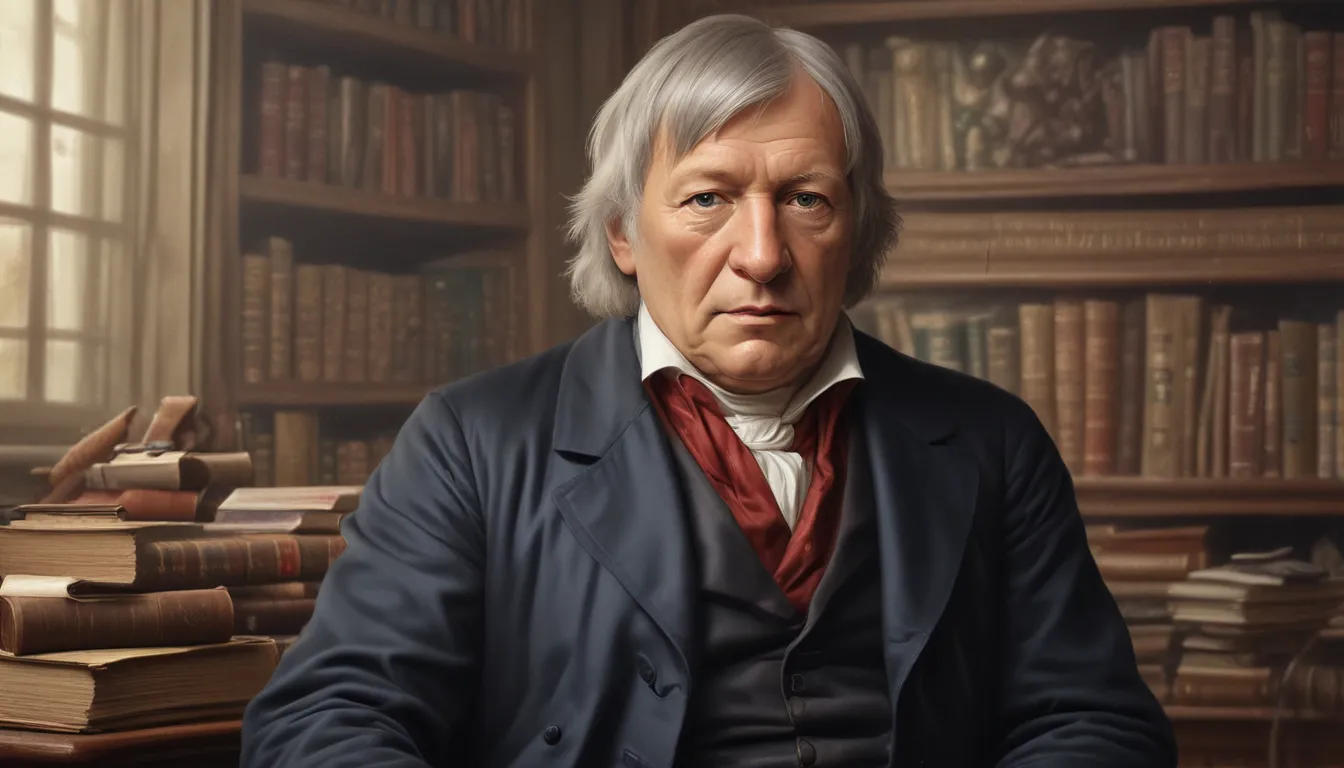The images in our articles may not match the content exactly. They are used to grab your attention, not to show the exact details in the text. The images complement the text but do not replace it.
Are you ready to embark on a journey through the profound intellect of one of history’s most influential philosophers? Georg Wilhelm Friedrich Hegel, known for his groundbreaking philosophical concepts and complex ideas, continues to shape modern philosophy and social sciences. In this article, we will delve into 11 captivating facts about G.W.F. Hegel that offer a glimpse into his life, philosophy, and enduring impact on the world of thought.
Exploring Hegel’s Intellectual Universe
Let’s unravel the essence of Hegel’s philosophy and the significant contributions he made to the realm of intellectual discourse. From his innovative dialectical method to his influence on philosophical movements, Hegel’s legacy is as profound as it is enduring. Whether you’re a seasoned scholar of Hegel or simply intrigued by the mysteries of his profound mind, this article promises to provide you with a fresh perspective on the life and work of G.W.F. Hegel.
Key Insights into G.W.F. Hegel’s Legacy
- G.W.F. Hegel’s dialectical method revolutionized philosophy by demonstrating how conflicting ideas can lead to a deeper truth through synthesis.
- Hegel’s philosophy influenced Marx, existentialism, and art, shaping diverse areas of thought and leaving a lasting impact on intellectual discourse.
The Revolutionary Concept of Dialectics
Hegel’s dialectical method transformed the study of philosophy by introducing the idea that conflicting ideas, known as thesis and antithesis, can be resolved through a synthesis, leading to a higher understanding of truth.
Unveiling “The Phenomenology of Spirit”
Hegel’s seminal work, “The Phenomenology of Spirit,” serves as a cornerstone of his philosophical system. This groundbreaking treatise explores the journey of self-consciousness and the evolution of knowledge, laying the foundation for his intricate philosophical framework.
The Influence on Karl Marx
Karl Marx drew inspiration from Hegel’s dialectical method, adapting it into his theory of historical materialism, which in turn became the foundation of Marxism. The intellectual dialogue between Hegel and Marx continues to shape political thought and social theory.
Embracing Historical Progression
Central to Hegel’s philosophy is the belief in the significance of historical progression. According to Hegel, history unfolds through a series of conflicts and resolutions, ultimately leading to the development of human freedom and self-awareness.
The Critique of Individualism
Hegel challenged the notion of individualism, arguing that true freedom and self-realization can only be attained within a collective society, emphasizing the interconnectedness of individuals within a broader social framework.
Inspiring Existentialist Thinkers
Existentialist philosophers such as Jean-Paul Sartre and Martin Heidegger were profoundly influenced by Hegel’s ideas on subjective experience and the search for meaning in a complex and often chaotic world. Hegel’s concepts continue to resonate within existentialist thought.
Acknowledging the Intrinsic Value of Art
Hegel attributed intrinsic value to art, viewing it as a profound expression of the spirit of an era and a catalyst for cultural development within society. His insights on aesthetics continue to influence artistic theory and interpretation.
Revered Lectures on Aesthetics
Hegel’s lectures on aesthetics delve into the nature of beauty, artistic creativity, and the transformative power of art in shaping human experience. These lectures are regarded as pivotal in the development of aesthetic theory and appreciation.
Conceptualizing the “World-Spirit”
Hegel’s concept of the “world-spirit” represents an all-encompassing spirit that guides historical progress and shapes the collective consciousness of humanity, reflecting his vision of a unified and evolving global community.
Diverse Interpretations of Hegel’s Philosophy
Throughout history, Hegel’s philosophy has been subject to diverse interpretations, giving rise to movements such as neo-Hegelianism and post-Hegelianism. The richness and complexity of Hegel’s ideas continue to inspire intellectual exploration and debate.
A Comprehensive Philosophical Framework
Hegel’s philosophical system encompasses a wide array of disciplines, including logic, metaphysics, ethics, politics, and aesthetics, offering a comprehensive and interconnected framework for understanding the complexities of human thought and society.
These 11 intriguing facts about G.W.F. Hegel offer a glimpse into the profound influence and enduring legacy of this iconic philosopher. From his groundbreaking concepts to his lasting impact on intellectual discourse, Hegel’s ideas continue to shape our understanding of the world and our place within it.
In Conclusion
The life, philosophy, and influence of G.W.F. Hegel have left an indelible mark on the history of Western philosophy. His works, such as “Phenomenology of Spirit” and “Science of Logic,” remain essential texts for scholars and enthusiasts alike, offering valuable insights into the complexities of human thought and societal evolution. Hegel’s ideas, including the dialectical process, continue to inspire critical discourse and reflection.
FAQs: Your Guide to G.W.F. Hegel
-
Who was G.W.F. Hegel?
G.W.F. Hegel, born Georg Wilhelm Friedrich Hegel, was a renowned German philosopher and a pivotal figure in Western philosophy during the 19th century. He developed a comprehensive philosophical system characterized by his dialectical method. -
What is Hegel’s dialectical method?
Hegel’s dialectical method involves a triadic process of thesis, antithesis, and synthesis, offering a profound insight into how contradictions and conflicts can lead to higher truths and understanding. -
What are some of Hegel’s major works?
Some of Hegel’s major works include “Phenomenology of Spirit,” “Science of Logic,” and “Elements of the Philosophy of Right,” each exploring different aspects of philosophy, history, and political theory. -
How has Hegel’s philosophy influenced modern thought?
Hegel’s philosophy has had a profound impact on a variety of fields, including philosophy, political theory, sociology, and literary theory. His ideas on historical development and dialectics continue to shape our understanding of society and culture. -
What is the significance of Hegel’s ideas?
Hegel’s ideas have profoundly influenced how we perceive history, consciousness, and social progress. His emphasis on contradiction and change has resonated with many subsequent philosophers and thinkers. -
How does Hegel’s philosophy relate to politics?
Hegel’s political philosophy explores the intricate relationship between individual freedom and the state, advocating for a balance between individual rights and collective will, influencing modern political ideologies like liberalism and socialism. -
Was Hegel a controversial figure?
Yes, Hegel’s ideas were met with controversy during his time and remain subjects of debate today. The complexity of his writing style and his abstract philosophical concepts have made his work challenging to interpret and fully comprehend. -
How did Hegel’s philosophy impact the world?
Hegel’s philosophy has permeated various facets of society, including politics, culture, and intellectual thought. His ideas have influenced social movements, political ideologies, and artistic expressions, leaving an enduring imprint on the world. -
Why should we study Hegel?
Studying Hegel is essential for those interested in philosophy, intellectual history, or political theory. His ideas remain relevant and offer valuable insights into understanding the complexities of human society and thought. -
What is Hegelianism?
Hegelianism refers to the philosophical system developed by Hegel and the thinkers influenced by his ideas, emphasizing dialectics, historical development, and the reconciliation of contradictions. -
How can I start learning about Hegel?
A good starting point for learning about Hegel is to engage with his major works such as “Phenomenology of Spirit” and “Science of Logic.” Additionally, there are many introductory books and online resources available that provide accessible explanations and interpretations of Hegel’s philosophy.
Dive deeper into the captivating world of G.W.F. Hegel and discover more intriguing facts about his life and work in our comprehensive article on Hegelianism. If you’re eager for a linguistic adventure, explore the complexities of Belarusian, a language rich in dialectical nuance. And don’t miss the opportunity to explore the life and work of another influential thinker, Edmund Husserl, the pioneering father of phenomenology. Each article promises a unique perspective on these fascinating subjects, enriching your knowledge and stimulating your curiosity.
Your Feedback Matters
Our dedication to providing reliable and engaging content is at the core of our mission. Each fact shared on our platform is contributed by individuals like you, ensuring a diverse range of insights and information. Our team of editors meticulously reviews each submission to uphold the highest standards of accuracy and authenticity. Trust in our commitment to quality as you embark on a journey of exploration and discovery with us.






